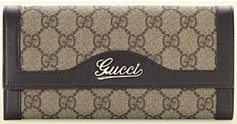In April 2014, Guess lodged an appeal against a lawsuit filed Gucci. This is the latest development in the case in China after Gucci’s lawsuits were dismissed in the US and Italy.
Guess and Gucci are two of the most recognizable brands in the world of fashion. They both start with the letter “G” and contain five letters. They both feature prolific use of G logos on their product lines, and they both have fiercely loyal customer bases from over 100 countries. But Guess and Gucci could not be more different.
Recently, Gucci initiated serial lawsuits against Guess and its affiliates to attempt to block Guess from using the letter “G” in its logos, including its Quattro G and G-shine logos, and from spelling the Guess name in cursive font.
Guess

Gucci

Courts in New York and Gucci’s hometown, Milan, Italy, rejected Gucci’s claims, acknowledging the fact that courts worldwide have long recognized that no company -- not Givenchy, Guerlain, Giorgio Armani, Gucci or Guess -- can claim exclusive ownership of the letter “G” or exclusive ownership of a font type. A universal principal in trademark law is that infringement only exists when consumers are likely to be confused by the marks, not when two brands simply share a common letter or font style. The courts in New York and Milan recognized that customers easily know the difference between a Guess product and one sold by Gucci. Even if the Guess product features a logo consisting of a “G” or displays the Guess name in cursive, consumers were not likely to be confused when making their purchasing decisions.
Unsuccessful in the US and Italy, Gucci turned to Jiangsu province, China, for their next attack on the Guess brand. Late last year, the Nanjing Intermediate People’s Court agreed with the courts of Milan and New York and held that Guess was free to sell products bearing its highly-successful “Quattro G” logo pattern. In a strange twist, however, the Nanjing Intermediate People’s Court forbade Guess from selling products with a “G” logo, including its G-shine logo pattern, or products that featured the Guess name in cursive.
In reaching its decision, the Nanjing Intermediate People’s Court, in a significant departure from current Chinese case law, decided that the only thing that matters in an infringement case is whether the marks look subjectively similar, not whether consumers are likely to be confused. In rendering its decision, the Nanjing Intermediate People’s Court implied that Chinese consumers are not as sophisticated as their American or European counterparts when distinguishing between the logos of foreign brands, despite the fact that Guess and Gucci, and many other international fashion houses, have existed in the Chinese and global market places for decades. The court stated that “Chinese consumers do not know or are not familiar with foreign languages and are more inclined to focus on the shape of the words” in recognizing trademarks in a foreign language.
Guess has appealed the Nanjing decision on these points and others arguing that, in cases involving competitor companies, Chinese law requires evidence of consumer confusion before a finding of infringement can be made. The case will be reviewed this year by a higher court.
Mr. Marciano promised to take the case all the way to the Supreme Court if necessary. “Gucci is a bully,” Mr. Marciano said. “When Gucci was unable to compete in the marketplace, they ran to courts in New York and Milan. When Gucci lost there, they ran to Nanjing. The Nanjing decision will be overturned because Chinese consumers are some of the most fashion-savvy buyers in the world. We are confident that they know the difference between Guess products and Gucci products.”
The case is on appeal in the Jiangsu Higher People’s Court, where the first hearing is currently scheduled in May.


